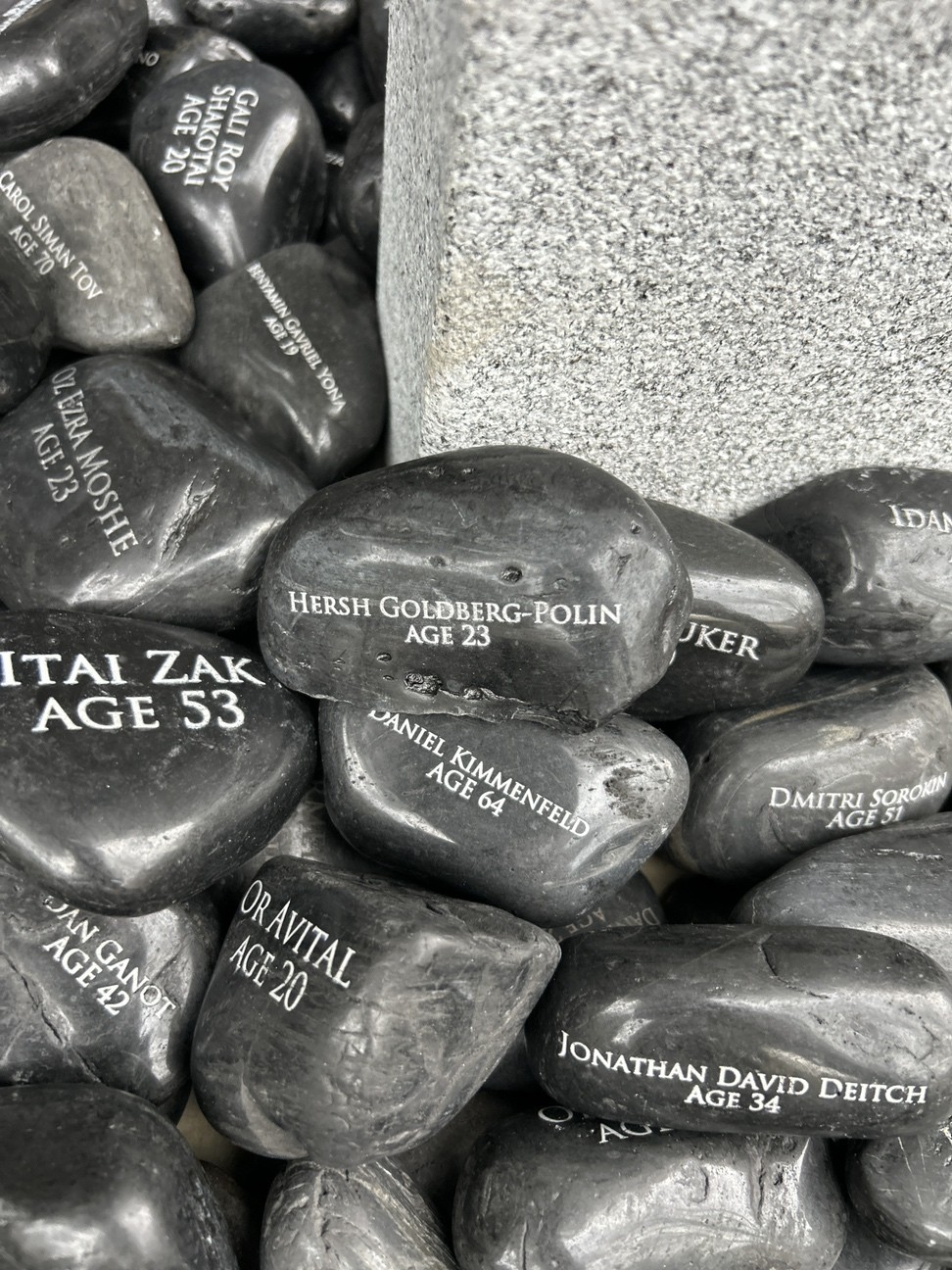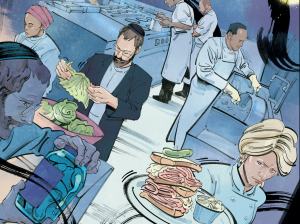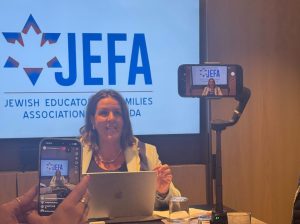The garden of Temple Sholom Synagogue in Vancouver is now a serene and contemplative place to remember the horrific events of Oct. 7, 2023—and the Israeli civilians, soldiers and foreign nationals who have lost their lives since that day.
A monument initially envisioned by Senior Rabbi Dan Moskovitz draws on the Jewish tradition of placing stones when visiting the graves of the deceased and the ‘stumbling stones’ of Europe, brass plates set outside the homes where Jews lived before they were deported and killed during the Holocaust.
The proximity to the temple’s Holocaust memorial is also a heartbreaking reminder of Jewish tragedy and loss.
Comprised of 33 large boulders, each inscribed with the name of a town or kibbutz attacked on Oct. 7, the monument also acknowledges those killed at the Nova music festival. Encircling its base are 1,658 small black stones, each one bearing the name and age of a victim.
The act of placing stones on a grave signifies that the person is remembered and honoured. It reflects the belief that the soul continues to exist in the afterlife and that the memory of the deceased remains in the hearts of the living. In this case, Rabbi Moskovitz’s intention was to make sure those who were killed were remembered not as one massive number but as individual human beings. Every person had a unique life story, just as each stone is unique.
It was this topic that Rabbi Moskovitz talked about in his heartfelt Yom Kippur evening sermon, days after the one-year anniversary of the Oct. 7 attacks. Congregants were asked to take home a small, black stone inscribed with the name and age of a victim of the Hamas attacks or the Israelis killed in the war since then—and they were asked to research the name engraved on their stones; learn their story, their plans, and to even write a message on the stone if they wished.
Synagogue members were then requested to bring their stones back two weeks later on Simchat Torah, when the monument would be dedicated on the Hebrew calendar anniversary of Oct. 7, which is otherwise a joyous holiday.
The sermon had a profound impact both in person and online, with people writing in response from as far away from Thailand.
Inspiration also came from the metal bracelets with the names of Soviet refuseniks—the Jews who were denied permission to emigrate to Israel—that Rabbi Moskovitz recalled wearing as a teenager.
“The idea struck me that we must hold on to the names of the hostages, share them and never let the world forget their torment and danger. I also wanted to do something to help raise money for the families and all of those in Israel forever changed and impacted by Oct. 7.”
And so began the production and distribution of 10,000 bracelets engraved with the name of each hostage, their age and where they were taken from in a project called Till They All Come Home. The project has raised $35,000 so far for Israeli charities.
As the anniversary approached, the rabbi used the bracelet project to inspire the memorial stones. The Temple Sholom Sisterhood provided the funding to purchase 1,000 pounds of stones and commission a five-foot-tall monument for the synagogue garden. Each stone was personally engraved by the rabbi and his family and the project took over one month. Every victim was researched, and often the entire family grieved as they reflected upon the age, and the personal stories.

“Chana Kritzman’s was the first stone I picked up,” said Barb Halparin, a Temple Sholom congregant. “Its shape, a glistening black tear drop, attracted my attention. Chana’s age, 88, was etched below her name and I felt the immediate kinship of senior womanhood. Googling her name only intensified my sense of identification with her.
“I learned that as a founding member of Kibbutz Be’eri, Chana had established the kibbutz library, where the kibbutz said she ‘raised her children and grandchildren on a love of books, reading, and the art of storytelling.’
“I’ve been an avid reader all my life, and I earned my BA in English literature. I value my membership in the Isaac Waldman Library, and my favourite gift to my grandchildren is a book,” Halparin said.
Kritzman was shot by Hamas invaders while being evacuated from her home. She fought for her life in hospital for two weeks before succumbing to her wounds.
Reading about Kritzman, her life, her love of words, her senseless suffering and her death was a deeply emotional experience for Halparin, as was placing her stone beside the memorial’s larger rock dedicated to Kibbutz Be’eri.
“It felt like I was in some small way bringing her home. When Rabbi Moskovitz introduced the stumbling stone concept, I was deeply touched and eager to participate in such a meaningful project of remembrance.” she said.
Reisa Schneider, another member of Temple Sholom, said that “one of the stones I took home was of Tair David who was 23 years old when she and her sister Hodaya, (age 26), were murdered by Hamas terrorists at the Supernova music festival. They were from the town of Beit Dagan. Their father, Uri, spent 30 minutes on the phone with them. He could hear blasts of gunfire nearby; he instructed them to lie on the ground, hold hands and breathe. Their connection was cut, he never heard from them again.”
On social media, their sister Liza wrote that Tair was “just like her name, a child of light, with a smile that could be seen for miles and a presence that is hard to hide.”
“I found it interesting, maybe even coincidental, that the name of the person who I was expected to remember meant light,” said Schneider. “We gave our middle daughter the Hebrew name, Orah, which also means light. Additionally, my maiden name is Smiley. I have tried to keep the name alive by smiling authentically and frequently. I have happily and intentionally passed that quality on to my daughters and grandchildren. I plan to honour Tair’s memory by bringing light into this broken world and by continuing to smile, despite these challenging times.”
Synagogue member Louise Krivel wrote: “After hearing Rabbi Moskovitz’s amazing sermon on Yom Kippur and learning about the over 1,600 rocks that his family had engraved in memory of the victims of Oct. 7 and beyond, I felt a tremendous sense of responsibility to honour the memory of the individuals whose rocks our family had been given.
“I researched each one and reached out to a couple of Israeli families via Facebook to advise them of our synagogue’s memorial and to let them know what Rabbi Moskovitz had been responsible for creating.”
Yoni Znati, the father of Matan Znati, a 23-year-old festival goer who died protecting his girlfriend, was one of those grieving family members Krivel contacted. He’s asked for photos of the memorial and said he hopes that one day he can meet Krivel so that he can tell her more about Matan.
Jenny Wright is a writer, music therapist, children’s musician and recording artist in Vancouver.







